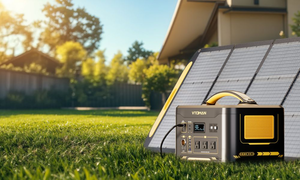
A Practical Guide to Running Household Devices on Portable Power
NEW ROCHELLE, NY, April 15, 2025 /24-7PressRelease/ -- Power stations are becoming an increasingly popular option for powering household appliances during power outages or for those living in off-grid environments. If you're considering purchasing one, you might be wondering: Can a power station run a refrigerator, TV, or air conditioner? In this article, we'll explore the capabilities of power stations for these common household appliances and give you a better understanding of how they work, what size power station you'll need, and whether they're suitable for your needs.
What is a Power Station?
A power station, also known as a portable power station or battery generator, is a device designed to store electricity and provide power to electrical appliances. These devices are equipped with rechargeable batteries, inverters, and various ports that allow you to power or charge items such as laptops, phones, small appliances, and more.
Power stations come in different sizes and capacities, ranging from small, lightweight units that can charge a phone to larger, more powerful units capable of powering multiple appliances simultaneously. They are typically charged via wall outlets, solar panels, or car adapters, making them versatile and reliable for various applications.
Can a Power Station Run a Refrigerator?
Refrigerators are among the most commonly used appliances in any household, and their power consumption varies depending on the size, model, and energy efficiency. Typically, a refrigerator consumes between 100 and 800 watts of power. However, it's important to note that refrigerators use more power when starting up due to the compressor kicking in.
A power station can run a refrigerator, but the size and capacity of the power station will determine how long it can sustain the appliance. A small power station with a 300-watt capacity might struggle to power a refrigerator, as the startup surge could be too high. On the other hand, a larger power station with a capacity of 1000 watts or more should be able to handle the startup surge and run a refrigerator for several hours.
For example, portable power stations like the vtoman FlashSpeed 1500 or the Jump 1800 are well-suited for running refrigerators, especially during power outages or camping trips. These power stations have enough capacity to power mid-sized refrigerators and offer long runtimes, depending on the model.
What Size Power Station Do You Need to Run a Refrigerator?
When selecting a power station for your refrigerator, the most important factors to consider are the wattage and battery capacity. Refrigerators usually need a higher wattage to handle the startup surge (sometimes up to 3 times the normal running wattage). A typical 500-watt refrigerator might require a power station with a capacity of at least 1000 watts to ensure it operates smoothly.
Additionally, battery capacity is essential for determining how long your power station can run the appliance. Battery capacity is measured in watt-hours (Wh), and a power station with a higher Wh rating will provide longer runtime. For instance, if your refrigerator consumes 500 watts and the power station has a battery capacity of 1000 Wh, it will run the refrigerator for approximately two hours, assuming no other appliances are running.
Can a Power Station Run a TV?
Television sets generally consume less power than refrigerators or air conditioners, making them a more manageable load for a power station. The power consumption of a TV depends on the type of display, screen size, and whether it's an LED, OLED, or plasma model. On average, a TV consumes between 50 and 400 watts, with energy-efficient LED models being on the lower end of the spectrum.
Portable power stations can certainly run TVs, especially smaller models or LED TVs. For example, a 300-watt power station could run a small LED TV for several hours, while a 500-watt power station could power a larger TV for even longer. If you plan to run your TV for extended periods, a larger power station like the Goal Zero Yeti 1000 would provide a longer runtime.
What Size Power Station Is Needed for a TV?
The size of the power station needed to run a TV depends on the wattage required by the TV and the desired runtime. For instance:
A small 32-inch LED TV might consume around 60 watts.
A 50-inch LED TV could use between 100 and 200 watts.
A larger plasma TV may use up to 400 watts or more.
If you plan to use a power station to run a TV for several hours, you'll need to choose one with sufficient battery capacity. For example, a 500-watt power station with a battery capacity of 500 Wh could run a 100-watt TV for about 5 hours.
Can a Power Station Run an Air Conditioner?
Air conditioners are high-power appliances that can require anywhere from 1000 watts to over 4000 watts, depending on the type and size. Their energy demands make them one of the more challenging appliances to run on a power station, especially portable ones.
Most portable power stations, which typically provide up to 1000 watts of power, are not suitable for running large air conditioning units. However, small air conditioners (like portable units or window ACs) that consume around 1000 to 2000 watts can be powered by larger power stations designed for heavy-duty use. Units such as the EcoFlow Delta Pro or the Bluetti AC200P can run smaller air conditioners, but even these models may only provide a few hours of runtime.
What Size Power Station Is Needed for an Air Conditioner?
The size of the power station needed to run an air conditioner depends on its power requirements. For a portable air conditioner with a power consumption of 1000 watts, a power station with a capacity of at least 2000 watts or more is recommended to handle the startup surge and maintain the AC unit's operation.
A small portable AC (5000 BTU) could be powered by a 1000-watt power station.
A larger AC unit (10,000 to 12,000 BTU) may require a 2000-watt power station or larger.
It's important to keep in mind that the runtime will be limited, so you may need to charge your power station during use if you intend to keep the air conditioner running for an extended period.
How Long Can a Power Station Run a Refrigerator, TV, or Air Conditioner?
The runtime of a power station depends on both the appliance's power consumption and the power station's battery capacity. To calculate the runtime:
Refrigerator: A 1000 Wh power station running a 500-watt refrigerator could provide around 2 hours of runtime.
TV: A 500 Wh power station running a 100-watt TV could last for 5 hours.
Air Conditioner: A 2000 Wh power station running a 1500-watt air conditioner could run for about 1 to 1.5 hours.
It's important to factor in battery efficiency, as real-world conditions may reduce the expected runtime.
What Are the Best Power Stations for Running Appliances Like Refrigerators, TVs, or Air Conditioners?
When it comes to choosing the best power stations for high-demand appliances, consider the following options:
Jackery Explorer 1000: A highly recommended portable power station with 1000 watts of output and a 1002 Wh battery, ideal for running refrigerators and TVs.
Bluetti EB150: A 1500-watt power station with a 1500 Wh battery, capable of running a refrigerator for extended periods.
EcoFlow Delta Pro: A powerhouse with 3600 watts of output, perfect for running air conditioners, refrigerators, and TVs in off-grid or emergency situations.
Summary
In conclusion, a power station can run a refrigerator and a TV with the right wattage and battery capacity. However, air conditioners require more power and may only be feasible for smaller units with high-capacity power stations. Be sure to calculate your appliance's power consumption and select a power station that offers enough output and battery life for your specific needs. Whether you need backup power during an outage or a portable solution for camping, choosing the right power station can provide a reliable source of energy for your household appliances.
---
Press release service and press release distribution provided by https://www.24-7pressrelease.com






